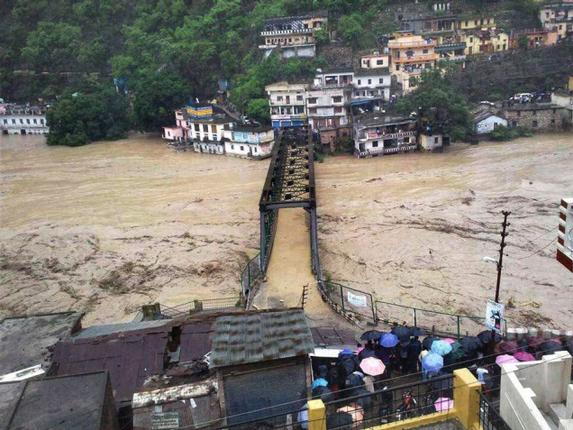It was neither a downpour nor heavy rainfall. It is described as an “extreme rainfall event, and these trends are increasing during the monsoons, say experts
If anyone wants to explain the meaning of ''it fell like a pack of cards’’ to a child, the visuals of the building crashing and falling in the swelling waters of the Ganga in Uttarakhand in the floods at the onset of monsoon would stand out as the best example.
Many other buildings crashing, cars being washed away as small specks of dirt in the water would make readymade visuals for any disaster movie. Nature’s fury was clearly coming down hard, resulting in the death of nearly 140 people and over 70,000 persons being affected as last reports came in late Wednesday afternoon.
ALSO READ: "Let the rivers be, and they won't harm you"
But the question people across the country have been asking since the time the surging waters made putty of that building is why has nature behaved in such an erratic manner. The scientific community has several reasons for this.
First, the erratic behaviour of the rain gods is not unusual. It was neither a downpour nor heavy rainfall. It is described as an ''extreme rainfall event. And these trends are increasing during the monsoons,’’ says Dr M Rajeevan, advisor, union ministry of earth sciences.
This is not just Rajeevan’s assessment. Several studies in 2006, 2007 and 2010 have clearly established that such “extreme events are bound to take place more frequently”. Such events lead to flash floods, affecting life and property and, generally, cause havoc all around.
''But meteorologists cannot forewarn before 24 hours,’’ says Rajeevan. Such warnings are, invariably, delivered to the state. These warnings are also accompanied with an advisory not to send people, primarily pilgrims to Kedarnath, uphill.
It is obvious that the state government was not prepared to receive in the first place the monsoons itself and, least of all, an ''extreme monsoon event.’’ It is a different matter that this year the monsoon lashed the country a month in advance. What was supposed to be delivered by July 15 in a temporally sustained manner was just dumped by June 16.
As Dr MR Ramesh Kumar of the National Institute of Oceanography, Goa, tells Governance Now: “If you do not eat for 10 days and suddenly on the 11th day you want to eat all that you did not for 10 days, it will naturally affect your system. This is certainly a situation that we should anticipate because the breaks in monsoon and the intense events can be quite disastrous.’’
But the havoc could have been minimised if the forest cover was not drastically reducing, there were no dramatic land-use changes, better water management, and a planned development of the region.
Maj Gen BC Kanduri, the former chief minister of Uttarakhand, says: “There should be a proper development plan for the Himalayan states. If you don’t cut trees, you cannot have roads. If you cannot have power projects, how will people live? Now, we are told the buildings should not have come up so close to the rivers. The basic concept we are suggesting is that a developmental policy needs to be evolved for the Himalayan region covering the states from Jammu and Kashmir to the Northeast.”
Khanduri has support from Sunita Narain of the Centre for Science and Environment.
The scientific community does not think there should be a separate plan for the Himalayan region alone. “There is need for a development plan based on the environmental aspect, and it need not be only for the Himalayan region. It has to cover all parts of the country because each part has a different issue,” says Dr Ramesh Kumar.
The point being made by the scientists clearly means that the structures that fell need not have been allowed to be constructed so close to where the river flows. It also means there need not have been a 1,000-percent increase in the registration of vehicles in a short span of time to meet the demand of religious tourism.
As a scientist, who did not want to be named, puts it, “Uncontrolled development does cause bigger problems. It hurts the future very badly.’’
The Uttarakhand tragedy, it appears, was waiting to happen. Will it lead to a change in governance? Given the current record of the powers-that-be, whether at the centre or the states, it would be a difficult question to answer.

